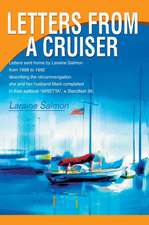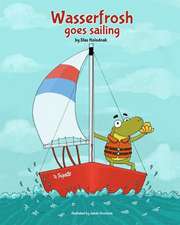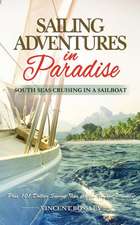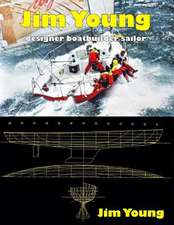The Water in Between: A Journey at Sea
Autor Kevin Patterson Editat de Alice Van Straalenen Limba Engleză Paperback – 31 mai 2001
A stint in the army and a broken heart lead Kevin Patterson, who has never sailed before, to buy a 37-foot sailboat. He recruits a more experienced sailor-another brokenhearted guy-and together they set sail for Tahiti, hoping to burn away their miseries in hard miles at sea.
At first Patterson finds life under sail distinctly less heroic than the travel literature that has inspired him. But when his companion remains behind, Patterson single-handedly sails his boat across the North Pacific and through a perilous four-day gale, truly testing himself against the elements.
Preț: 107.92 lei
Nou
Puncte Express: 162
Preț estimativ în valută:
20.65€ • 21.48$ • 17.05£
20.65€ • 21.48$ • 17.05£
Carte tipărită la comandă
Livrare economică 14-28 aprilie
Preluare comenzi: 021 569.72.76
Specificații
ISBN-13: 9780385498845
ISBN-10: 0385498845
Pagini: 304
Dimensiuni: 133 x 203 x 17 mm
Greutate: 0.26 kg
Editura: Anchor Books
ISBN-10: 0385498845
Pagini: 304
Dimensiuni: 133 x 203 x 17 mm
Greutate: 0.26 kg
Editura: Anchor Books
Notă biografică
Kevin Patterson grew up in Selkirk, Manitoba, and put himself through medical school by enlisting in the Canadian Army. When his stint was up, he worked as a doctor in the Arctic and on the B.C. coast while studying for his MFA at UBC. His short fiction has been published in Descant and Canadian Fiction Magazine. He is currently a resident in internal medicine at Dalhousie in Halifax and a regular corres-pondent for Saturday Night magazine. The Sea Mouse is moored on Salt Spring Island.
From the Hardcover edition.
From the Hardcover edition.
Extras
Chapter One
In August of 1994, I bought a twenty-year-old ferro-cement ketch on the coast of British Columbia. I did this in an effort to distract myself-at the time I was so absorbed in self-pity my eyes were crossed. I had been wandering around marinas sorrowfully leaning my head against dock pilings and losing my train of thought; I had the demeanor of an aging milk cow with the scours. People who met me thought I was either drunk or deranged. The most immediate cause of all this was a woman half a continent away who had been headed further for months. My sadness at our parting was histrionically out of proportion to anything that could have been justified by events.
I spent weeks chain-smoking and staring at the ground. At the time I was working as a doctor at a summer camp for Canadian army cadets in the B.C. Interior. It was an absurd job and I made an absurd picture, shuffling around the dusty parade grounds, hands in pockets, sighing grandly and ignoring the columns of pubescent boys and girls marching stiffly past me. I was twenty-nine and had been out of the army myself for only a year.
That summer, many Canadian medical officers were being sent to Rwanda and Bosnia. The army had always provided a doctor for the camp, but now they were short-staffed, which is how I had come to be there. When they called to ask me to fill in, I was working up in the Arctic, on the coast of Hudson Bay. It was late June, and so cold that even the river ice hadn't broken yet. The sea pack was solid to the horizon. I said yes without even thinking.
At the time I was drifting and had been since the previous summer-ever since leaving the army. I had been in Winnipeg, on my way to the job in the Arctic, when I met her. There was a week of slow suppers and long, delicious conversation. This was earlier in the winter and she was gentle, very beautiful and a little melancholic, and I was entranced by her. When it came time for me to fly north, we made imprecise plans about how we would meet. We agreed to call and write often. I started work at a small hospital on the shore of Hudson Bay. My second day there, an old man became very sick and needed to be transferred to the intensive care unit in Winnipeg. I volunteered to accompany him. I called her from the airport. After leaving the hospital I took a cab straight to her house.
During the time I was up in the Arctic, we telephoned one another almost daily but avoided the question of whether I should move to the city or she should move up there. It was an obvious but awkward issue. Part of the delight we took in seeing one another was the intermittency of our contact. As if that made our visits more potent, rather than, with increasing time and distance, less and less. It is a banal and familiar circumstance. Among soldiers, or the nurses in the Arctic, it is a clich*.
Then the army phoned, with this job in British Columbia. I would be just as far from Winnipeg, working there. Off I went.
About a month after I arrived at the summer camp she came out to visit me. We stayed together in a resort near the army base with the memorable name of Teddy Bear Lodge. There were small cabins with televisions and a swing set for children. The mountains rose up all around, and across the highway from our cabin was a long, deep lake. We tried to swim there but it wasn't possible. It was much too cold.
Before this we had only had the hurried, lip-biting, kiss-filled visits in Winnipeg when I had come down on the air ambulance. The Teddy Bear Lodge got our hopes up, but in the sustained company of the other, we each forgot two-thirds of the words we knew. After two weeks she went home. Saying goodbye at the bus terminal, we didn't confront the issue.
A month later, she telephoned me at work to tell me about the man she had met. She told me his name and apologized. She subsequently married him and they now have a baby daughter. Our mutual friends tell me that she is happier than they've ever seen her. Her graciousness and kindness in our limited intimacy only made my anguish more potent and my feeling of victimhood more laughable. To feel unentitled to your self-pity about triples it.
My roommate at the summer camp became alarmed and embarrassed as he watched me involute into a black and anguished puddle of self-obsessed sorrow. It felt ridiculous even at the time. I was tearing my clothes over one of the most abbreviated love affairs I'd ever had; it made no sense. If I went back to the city she lived in, which I had lived in before the army, I thought that I would drown. In the army, desperate for distraction, I had daydreamed about sailing on the ocean. I was from Manitoba; I knew nothing about sailing and had never been on the ocean in a little boat of any sort.
I found myself standing on a dock in Genoa Bay, on the southern tip of Vancouver Island, in the company of a sixty-year-old man with a whiskey nose the size and color of a bruised and overripe beet. His name was Peter Ericson and he owned a sailboat brokerage, but his consuming passion seemed to be the promulgation of his theory that the Pacific Islands and most of the New World had been colonized by an ancient Scandinavian seafaring culture that revered magnetic fields. And maybe herring.
Before Ericson would even let me see his boats he had showed me his publications in the local Boat Journal. These were supposed to be advertisements for his business, but in fact they were long rants on the forgotten nobility of the Great White Gods, the Vikings, who journeyed forth in the ancient mists to show the less savvy races just how it was done. But the ghosts of the Norse sailor-folk could rest easy now, for Ericson had figured it out. And was bound to inform the world. Or, at any rate, me.
Even after I had steered him out onto the dock, he harangued me with evidence of blue-eyed Indians and tales of white-skinned gods in the Polynesian mythos. I wondered how he managed to make a living selling boats. I tried to get him to tell me about the boat we were standing in front of but he seemed obsessed with this idea of forgotten exploration. He told me that proof of contact between the Vikings and other civilizations was everywhere. For instance, the alignment of the Mayan temples in Meso-America corresponded precisely with lines of constant magnetic variation (whatever that was) and only a seafaring culture could understand magnetism so thoroughly. The great heads of Easter Island represent you-know-who, staring out to sea, of course. And could there be any doubt how the Polynesians came to possess the sweet potato of South American origin? Could there be?
In an attempt to forestall his quoting Chariots of the Gods to me, I quickly glanced around. The boat nearest us looked very beautiful. The sign on it said the hull was made of ferro-cement. "How does it float?" I asked.
The inanity of the question stalled him. His face twitched and twisted and he forced it into a more benign and patient gaze. "Steel doesn't float but steel boats do, right?"
"Oh, yeah," I said. It turned out that Ericson had been instrumental in popularizing the technique of ferro-cement boat construction twenty years previously, and he launched into another great enthusiasm. He assured me that such boats were immune to rot and rust, stable and sea-kindly in heavy weather. I wondered if the man had any ambivalent opinions about anything.
Ericson asked me what sort of price range I was thinking about. I told him how much money I had to spend. Remarkably, that was just the amount this boat was going for. I grew up in Manitoba. Farm country, basically. Mostly we played a lot of kick-the-can. "Shrewd" was a name you called someone smarter than you that you didn't like.
The boat was named the Sea Mouse. She looked lovely to me.
Ericson unlocked the companionway. He winked at me and said that he would let me putter about by myself, to have a look at the bilges or whatever. He'd be back in an hour or so. I sat below at the teak salon table and looked around her. The polished wood shone like a memory of grade-school wooden floors. I lifted up the hatch over the engine and peered into the mass of machinery. I had no idea what I was looking at. Satisfied that there seemed to be a proper number of belts and hoses and things, I closed the hatch. I stood up and looked out the forward hatches at the mast and pulpit. I thought about Ericson's idea of the Vikings, threading their way around the world in the first millennium. I could almost hear the waves surging over the deck. Me, clinging to the wheel and smiling wryly, my bronzed and newly muscular shoulders glinting in the sun. Lovely polished wood. Just lovely. I patted it. I wished I had a cheroot.
I poked through the lockers in the galley. There was a propane stove and oven, and a refrigerator. There was room for half a year's worth of rice and pasta and tomato sauce and dried mushrooms and apples and garlic and balsamic vinegar and bottles of wine and canned bacon and dried fish and sacks of onions and cabbages and potatoes and jars of marmalade. I imagined how that would feel, to have a boat, and all the food I would need for six months on her. Able to go anywhere I wanted. Enough stores to go halfway around the world.
Two hours later Peter found me there, grinning stupidly. The Sea Mouse was thirty-seven feet long, rigged as a ketch and displaced twelve tons. Her lines seemed to me as graceful as a dancer's. She carried tanks for sixty gallons of fresh water and forty of diesel. She had two masts and booms of spruce, the stays and shrouds were of stainless-steel wire and she had a forty-five-horsepower diesel engine. There was a six-mile radar and a head. Later on, as Peter and I sat working out the details of the purchase, the kerosene lamps glowed as orange as whiskey against the varnished teak and made the boat feel like a small and warm mountain cabin. She had a diesel furnace for heat. As the sun set there was a sense of rightness, of safety, within her. That sense of safety seemed like it would be only more striking at sea, in heavy weather.
Suffused with optimism and rum, I told Peter I wanted to sail to Tahiti. He squeezed my arm and said I must have Viking blood in me. I allowed that my mother's parents were Danish. That set him off for another hour, explaining again how historians were blind to the obviousness of his theory. I had just bought a boat. It wasn't hard to indulge him.
Peter's face softened as he recounted his fantasy. Once a sailor gets into the tropical trade winds, he told me, even the slowest boats make a hundred miles a day, three weeks to go two thousand miles. And the wind is so constant and warm, you could travel on a raft with a bedsheet for a sail-look at Thor Heyerdahl's Kon-Tiki. Compare that to the North Atlantic, scoured by contrary winds and storms like tantrums. Imagine a Viking crew, accustomed to sleet and steep frigid seas, driven south by a gale and finding themselves surrounded by water as warm as urine, pale blue and languid instead of green and frothed. Imagine that.
Pallid skin darkening as the filthy tunics and soiled sheepskins are shrugged off and accumulate in the stern of the boat-can you imagine what they felt then, as they pulled ashore in Huahine, in the South Pacific, and found mangos and coconuts, and waterfalls pouring down green mountains?
I found myself hoping that it had happened as he believed. I ignored the part about the Vikings teaching everyone else how to sail. (How exactly would the Polynesians have gotten there, if they couldn't navigate?) Peter had grown up in Manitoba himself, on a farm near the northern margin of arable land, and I pictured him in the 1940s, huddling in a drafty farmhouse as some January blizzard roared through. Longing to escape.
I asked him how long it would take me to get to Tahiti. He said five or six weeks. I told him I knew nothing about sailing. He assured me it was in my blood. He had taught himself to sail, after all, on the Tasman Sea, the day after the Australian Excise Police visited him and the boat he had just bought in Sydney, asking about some matter of back taxes. I asked him what one did out there alone at night. When you went to sleep, did you put out a sea anchor or what? He took a moment, as if contemplating his response, and then asked when I could get the check to him.
We stayed up drinking on my new boat until we were both very drunk. He told me again how the Norse had left their mark on all the cultures of the New World; did I realize the temples of the Mayans were oriented along lines of magnetic variation? I looked up from a chart of the South Pacific and finally asked what magnetic variation was. He said I would want to learn that. I agreed. He asked me again how much sailing I had done. I said none. He slapped me on the shoulder and congratulated me on my pluck. I asked him if he would show me what I needed to know. "Oh sure," he answered.
It was the first night I had ever slept on a boat. At some point, from real or perceived boat motion, I had fallen out of my berth. My back hurt. There were overflowing ashtrays and puddles of spilt rum and coke. Someone knocked on the hull. Peter Ericson was standing there in the morning sun, looking puffy. "I've been thinking about this singlehanding business," he said. I had been thinking about it, too.
"There's someone I know who I think you should meet."
The notion of sailing off into the sea alone and heartbroken retreated before me. So I wasn't quite as brave as I imagined. I pictured the navy helicopters pulling my swollen and bloated corpse from the water, the solemn commentary on the evening news.
In August of 1994, I bought a twenty-year-old ferro-cement ketch on the coast of British Columbia. I did this in an effort to distract myself-at the time I was so absorbed in self-pity my eyes were crossed. I had been wandering around marinas sorrowfully leaning my head against dock pilings and losing my train of thought; I had the demeanor of an aging milk cow with the scours. People who met me thought I was either drunk or deranged. The most immediate cause of all this was a woman half a continent away who had been headed further for months. My sadness at our parting was histrionically out of proportion to anything that could have been justified by events.
I spent weeks chain-smoking and staring at the ground. At the time I was working as a doctor at a summer camp for Canadian army cadets in the B.C. Interior. It was an absurd job and I made an absurd picture, shuffling around the dusty parade grounds, hands in pockets, sighing grandly and ignoring the columns of pubescent boys and girls marching stiffly past me. I was twenty-nine and had been out of the army myself for only a year.
That summer, many Canadian medical officers were being sent to Rwanda and Bosnia. The army had always provided a doctor for the camp, but now they were short-staffed, which is how I had come to be there. When they called to ask me to fill in, I was working up in the Arctic, on the coast of Hudson Bay. It was late June, and so cold that even the river ice hadn't broken yet. The sea pack was solid to the horizon. I said yes without even thinking.
At the time I was drifting and had been since the previous summer-ever since leaving the army. I had been in Winnipeg, on my way to the job in the Arctic, when I met her. There was a week of slow suppers and long, delicious conversation. This was earlier in the winter and she was gentle, very beautiful and a little melancholic, and I was entranced by her. When it came time for me to fly north, we made imprecise plans about how we would meet. We agreed to call and write often. I started work at a small hospital on the shore of Hudson Bay. My second day there, an old man became very sick and needed to be transferred to the intensive care unit in Winnipeg. I volunteered to accompany him. I called her from the airport. After leaving the hospital I took a cab straight to her house.
During the time I was up in the Arctic, we telephoned one another almost daily but avoided the question of whether I should move to the city or she should move up there. It was an obvious but awkward issue. Part of the delight we took in seeing one another was the intermittency of our contact. As if that made our visits more potent, rather than, with increasing time and distance, less and less. It is a banal and familiar circumstance. Among soldiers, or the nurses in the Arctic, it is a clich*.
Then the army phoned, with this job in British Columbia. I would be just as far from Winnipeg, working there. Off I went.
About a month after I arrived at the summer camp she came out to visit me. We stayed together in a resort near the army base with the memorable name of Teddy Bear Lodge. There were small cabins with televisions and a swing set for children. The mountains rose up all around, and across the highway from our cabin was a long, deep lake. We tried to swim there but it wasn't possible. It was much too cold.
Before this we had only had the hurried, lip-biting, kiss-filled visits in Winnipeg when I had come down on the air ambulance. The Teddy Bear Lodge got our hopes up, but in the sustained company of the other, we each forgot two-thirds of the words we knew. After two weeks she went home. Saying goodbye at the bus terminal, we didn't confront the issue.
A month later, she telephoned me at work to tell me about the man she had met. She told me his name and apologized. She subsequently married him and they now have a baby daughter. Our mutual friends tell me that she is happier than they've ever seen her. Her graciousness and kindness in our limited intimacy only made my anguish more potent and my feeling of victimhood more laughable. To feel unentitled to your self-pity about triples it.
My roommate at the summer camp became alarmed and embarrassed as he watched me involute into a black and anguished puddle of self-obsessed sorrow. It felt ridiculous even at the time. I was tearing my clothes over one of the most abbreviated love affairs I'd ever had; it made no sense. If I went back to the city she lived in, which I had lived in before the army, I thought that I would drown. In the army, desperate for distraction, I had daydreamed about sailing on the ocean. I was from Manitoba; I knew nothing about sailing and had never been on the ocean in a little boat of any sort.
I found myself standing on a dock in Genoa Bay, on the southern tip of Vancouver Island, in the company of a sixty-year-old man with a whiskey nose the size and color of a bruised and overripe beet. His name was Peter Ericson and he owned a sailboat brokerage, but his consuming passion seemed to be the promulgation of his theory that the Pacific Islands and most of the New World had been colonized by an ancient Scandinavian seafaring culture that revered magnetic fields. And maybe herring.
Before Ericson would even let me see his boats he had showed me his publications in the local Boat Journal. These were supposed to be advertisements for his business, but in fact they were long rants on the forgotten nobility of the Great White Gods, the Vikings, who journeyed forth in the ancient mists to show the less savvy races just how it was done. But the ghosts of the Norse sailor-folk could rest easy now, for Ericson had figured it out. And was bound to inform the world. Or, at any rate, me.
Even after I had steered him out onto the dock, he harangued me with evidence of blue-eyed Indians and tales of white-skinned gods in the Polynesian mythos. I wondered how he managed to make a living selling boats. I tried to get him to tell me about the boat we were standing in front of but he seemed obsessed with this idea of forgotten exploration. He told me that proof of contact between the Vikings and other civilizations was everywhere. For instance, the alignment of the Mayan temples in Meso-America corresponded precisely with lines of constant magnetic variation (whatever that was) and only a seafaring culture could understand magnetism so thoroughly. The great heads of Easter Island represent you-know-who, staring out to sea, of course. And could there be any doubt how the Polynesians came to possess the sweet potato of South American origin? Could there be?
In an attempt to forestall his quoting Chariots of the Gods to me, I quickly glanced around. The boat nearest us looked very beautiful. The sign on it said the hull was made of ferro-cement. "How does it float?" I asked.
The inanity of the question stalled him. His face twitched and twisted and he forced it into a more benign and patient gaze. "Steel doesn't float but steel boats do, right?"
"Oh, yeah," I said. It turned out that Ericson had been instrumental in popularizing the technique of ferro-cement boat construction twenty years previously, and he launched into another great enthusiasm. He assured me that such boats were immune to rot and rust, stable and sea-kindly in heavy weather. I wondered if the man had any ambivalent opinions about anything.
Ericson asked me what sort of price range I was thinking about. I told him how much money I had to spend. Remarkably, that was just the amount this boat was going for. I grew up in Manitoba. Farm country, basically. Mostly we played a lot of kick-the-can. "Shrewd" was a name you called someone smarter than you that you didn't like.
The boat was named the Sea Mouse. She looked lovely to me.
Ericson unlocked the companionway. He winked at me and said that he would let me putter about by myself, to have a look at the bilges or whatever. He'd be back in an hour or so. I sat below at the teak salon table and looked around her. The polished wood shone like a memory of grade-school wooden floors. I lifted up the hatch over the engine and peered into the mass of machinery. I had no idea what I was looking at. Satisfied that there seemed to be a proper number of belts and hoses and things, I closed the hatch. I stood up and looked out the forward hatches at the mast and pulpit. I thought about Ericson's idea of the Vikings, threading their way around the world in the first millennium. I could almost hear the waves surging over the deck. Me, clinging to the wheel and smiling wryly, my bronzed and newly muscular shoulders glinting in the sun. Lovely polished wood. Just lovely. I patted it. I wished I had a cheroot.
I poked through the lockers in the galley. There was a propane stove and oven, and a refrigerator. There was room for half a year's worth of rice and pasta and tomato sauce and dried mushrooms and apples and garlic and balsamic vinegar and bottles of wine and canned bacon and dried fish and sacks of onions and cabbages and potatoes and jars of marmalade. I imagined how that would feel, to have a boat, and all the food I would need for six months on her. Able to go anywhere I wanted. Enough stores to go halfway around the world.
Two hours later Peter found me there, grinning stupidly. The Sea Mouse was thirty-seven feet long, rigged as a ketch and displaced twelve tons. Her lines seemed to me as graceful as a dancer's. She carried tanks for sixty gallons of fresh water and forty of diesel. She had two masts and booms of spruce, the stays and shrouds were of stainless-steel wire and she had a forty-five-horsepower diesel engine. There was a six-mile radar and a head. Later on, as Peter and I sat working out the details of the purchase, the kerosene lamps glowed as orange as whiskey against the varnished teak and made the boat feel like a small and warm mountain cabin. She had a diesel furnace for heat. As the sun set there was a sense of rightness, of safety, within her. That sense of safety seemed like it would be only more striking at sea, in heavy weather.
Suffused with optimism and rum, I told Peter I wanted to sail to Tahiti. He squeezed my arm and said I must have Viking blood in me. I allowed that my mother's parents were Danish. That set him off for another hour, explaining again how historians were blind to the obviousness of his theory. I had just bought a boat. It wasn't hard to indulge him.
Peter's face softened as he recounted his fantasy. Once a sailor gets into the tropical trade winds, he told me, even the slowest boats make a hundred miles a day, three weeks to go two thousand miles. And the wind is so constant and warm, you could travel on a raft with a bedsheet for a sail-look at Thor Heyerdahl's Kon-Tiki. Compare that to the North Atlantic, scoured by contrary winds and storms like tantrums. Imagine a Viking crew, accustomed to sleet and steep frigid seas, driven south by a gale and finding themselves surrounded by water as warm as urine, pale blue and languid instead of green and frothed. Imagine that.
Pallid skin darkening as the filthy tunics and soiled sheepskins are shrugged off and accumulate in the stern of the boat-can you imagine what they felt then, as they pulled ashore in Huahine, in the South Pacific, and found mangos and coconuts, and waterfalls pouring down green mountains?
I found myself hoping that it had happened as he believed. I ignored the part about the Vikings teaching everyone else how to sail. (How exactly would the Polynesians have gotten there, if they couldn't navigate?) Peter had grown up in Manitoba himself, on a farm near the northern margin of arable land, and I pictured him in the 1940s, huddling in a drafty farmhouse as some January blizzard roared through. Longing to escape.
I asked him how long it would take me to get to Tahiti. He said five or six weeks. I told him I knew nothing about sailing. He assured me it was in my blood. He had taught himself to sail, after all, on the Tasman Sea, the day after the Australian Excise Police visited him and the boat he had just bought in Sydney, asking about some matter of back taxes. I asked him what one did out there alone at night. When you went to sleep, did you put out a sea anchor or what? He took a moment, as if contemplating his response, and then asked when I could get the check to him.
We stayed up drinking on my new boat until we were both very drunk. He told me again how the Norse had left their mark on all the cultures of the New World; did I realize the temples of the Mayans were oriented along lines of magnetic variation? I looked up from a chart of the South Pacific and finally asked what magnetic variation was. He said I would want to learn that. I agreed. He asked me again how much sailing I had done. I said none. He slapped me on the shoulder and congratulated me on my pluck. I asked him if he would show me what I needed to know. "Oh sure," he answered.
It was the first night I had ever slept on a boat. At some point, from real or perceived boat motion, I had fallen out of my berth. My back hurt. There were overflowing ashtrays and puddles of spilt rum and coke. Someone knocked on the hull. Peter Ericson was standing there in the morning sun, looking puffy. "I've been thinking about this singlehanding business," he said. I had been thinking about it, too.
"There's someone I know who I think you should meet."
The notion of sailing off into the sea alone and heartbroken retreated before me. So I wasn't quite as brave as I imagined. I pictured the navy helicopters pulling my swollen and bloated corpse from the water, the solemn commentary on the evening news.
Recenzii
"A first rate, quietly enthralling account othat belongs on the shelf with Theroux's Happy Isles of Oceania, Raban's sailings, and the work of landlubber Chatwin." ?Christopher Buckley, The New York Times Book Review
"[A]n old fashioned story of personal adventure that probes its own themes with subversive intelligence." ?The New York Times
"If a klutz like Patterson can sail to the South Seas, so can you. But writing about it this well is something else again." ?Outside
"[A]n old fashioned story of personal adventure that probes its own themes with subversive intelligence." ?The New York Times
"If a klutz like Patterson can sail to the South Seas, so can you. But writing about it this well is something else again." ?Outside
Descriere
A stint in the army and a broken heart lead Patterson to the dock of a sailboat brokerage on Vancouver Island, where he stands contemplating the romance of the ocean. His plan is to sail to Tahiti and back while burning away his failings in hard miles at sea.














